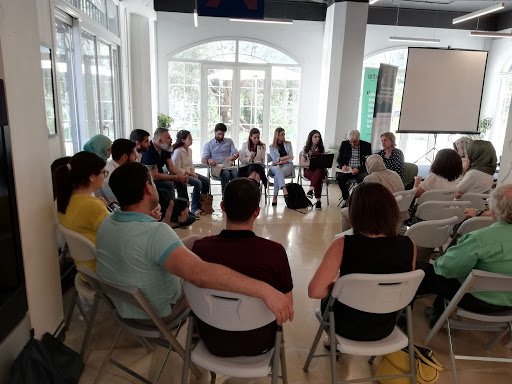News & Updates
Partnerships Matter: Bringing back effectiveness and ethics in civil work
On May 23, 2019, Lebanon Support, in partnership with the Arab NGO Network for Development organised a workshop on localisation, democratic ownership, mutual accountability and equitable partnerships. at antwork (Hamra).
The workshop was facilitated by independent consultant, Ahmad Mroue. The first session on understanding localisation and democratic ownership was moderated by Ziad Abdel Samad (Arab NGO Network for Development) who introduced. Nasser Yassine (Issam Fares Institute for Public Policy and International Affairs). Yassine started the discussion by giving a historical background of humanitarian aid and development in Lebanon, pre- and post-Syrian refugee crisis. He highlighted the fragmented programme-based approach used by donor organisations. He also stressed the need for a locally grounded implementation process of CEDRE, the Economic Conference for Development through Reforms and with Businesses for Lebanon. Mohammad Mansour (Lebanon Humanitarian and Development NGO Forum), shed light on the Grand Bargain and The World Humanitarian Summit’s principles, processes, and mechanisms that favour locally-led and implemented initiatives. He also highlighted the gaps which are hindering the achievement of the Grand Bargain such as the lack of financial tracking of funds, the exclusion of CSOs from all coordination processes, and their treatment as implementing partners only.
The second session on mutual accountability and equitable partnerships was moderated by Léa Yammine (Lebanon Support). Zeina Abla (independent researcher) , underlined the government-led disrupted development efforts for increased Public Private Partnerships (PPP) through the case study of CEDRE. She warned about the lack of initial studies done on the development impact of CEDRE projects, and the absence of clear indicators to measure success. She also highlighted the vagueness in the PPP law on crucial topics such as implementation, accountability, and risk distribution. Gilbert Doumit (Beyond Reform and Development), tackled the challenges for CSOs to be included in future PPP initiatives. He compared the case of CEDRE to similar national initiatives in the past, namely Horizon 2000, as the GDP to debt ratio and unemployment rates in Lebanon in 2004 are similar to those in 2019. He also compared CEDRE to other successful cases of PPP in different countries, to highlight the “close proximity” downfall of the current PPP initiative. According to Doumit, “the closer the proximity between public and private, the more dangerous it is.''
After each session, the floor was opened for questions and comments and participants were able to contribute to the conversation and raise their concerns, namely, the unclear definition of localisation, the monopoly of bigger CSOs over projects, and the lack of clear principles of partnership between CSOs and donors.
In the afternoon, the attendees were split into several working groups moderated by George Ghali (ALEF - Act for Human Rights), Leila El Ali (Association Najdeh) in the first session and Nadine Saba (Akkar Network for Development), and Adib Nehme, in the second session.


The working groups agreed to come up with a clear definition for localisation, to build trust between grassroots organisations and international donors, to share opportunities and build the capacity of grassroots organisations, to transfer capacities to donors and effectively participate in the entire decision-making process, and to redefine their relationships with partners based on equality and mutual respect.
The attendees also agreed to initiate a process towards the adoption and enactment of a civil society charter, for the first time in Lebanon, a step which is considered highly symbolic for upholding principles of partnerships, mutual accountability, and local ownership.

